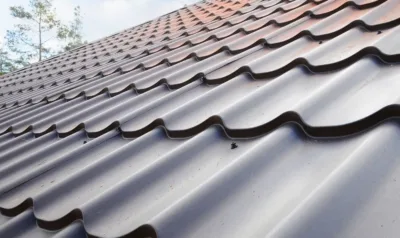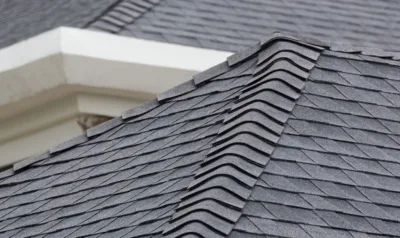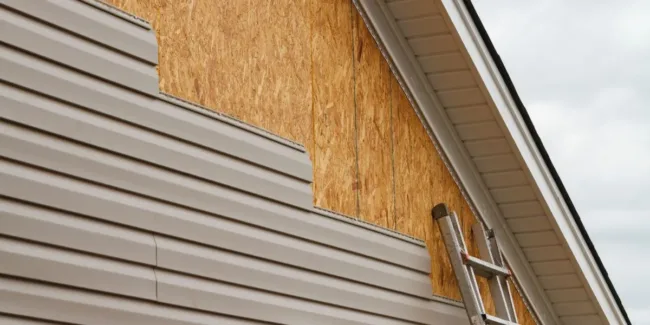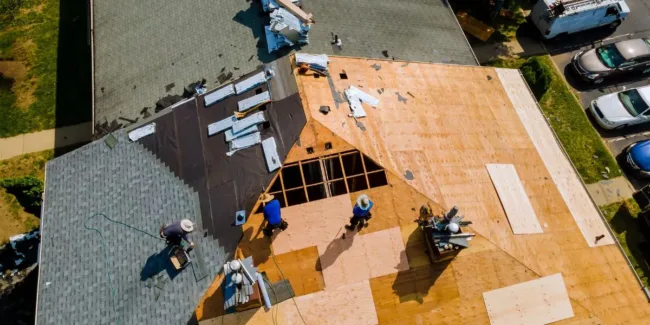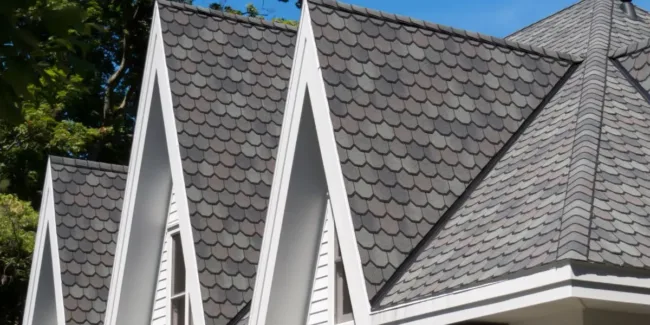Composite Shingles vs. Asphalt Shingles: Which Roof Is Right for You?
Asphalt shingles have been the dominant roofing material for decades, while composite shingle – also known as synthetic shingles -are a newer, premium option made to mimic high-end materials like slate and cedar. In this guide, we’ll compare composite shingles vs. asphalt shingles across categories like cost, durability, aesthetics, and environmental impact so you can decide which is best for your home and goals.
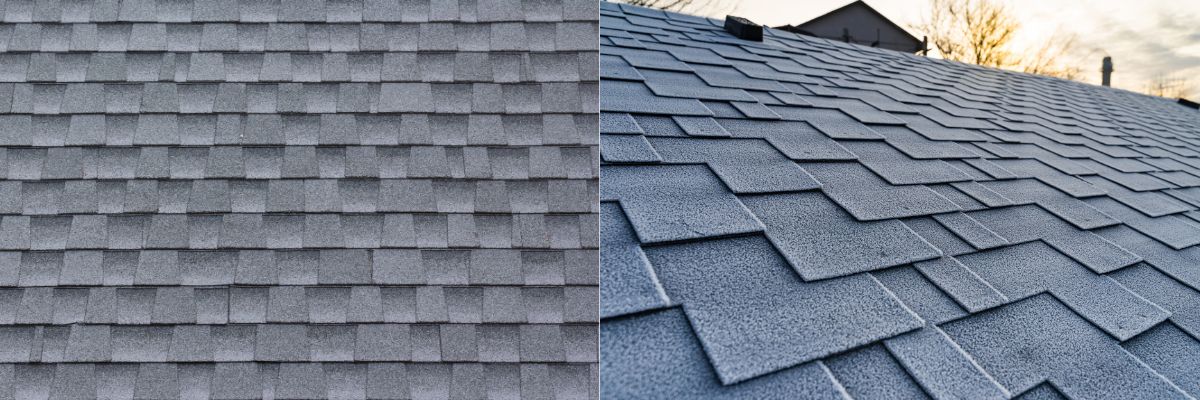
What Are Composite and Asphalt Shingles?
Composite shingles are made from synthetic polymers and often incorporate recycled materials. They’re engineered to replicate the appearance of slate, wood shakes, or tile while offering superior strength and longevity. Thanks to their layered design and material composition, they are more resistant to damage from weather and UV rays and often come with extended warranties.
Asphalt shingles are made with a fiberglass or organic mat core, topped with asphalt and mineral granules. They are available in 3-tab and architectural varieties, with architectural shingles offering more thickness, dimension, and durability. While they are less expensive and easier to install, asphalt shingles typically offer a shorter lifespan and are more vulnerable to damage in severe weather.
Asphalt Vs Composite Shingle Comparison Breakdown
| Feature | Composite Shingles | Asphalt Shingles |
| Material | Synthetic polymers (often recycled); mimics slate, wood, or tile | Fiberglass or organic mat with asphalt and mineral granules |
| Cost | 2–4 times more expensive than asphalt shingles | Most affordable roofing material available |
| Lifespan | 30–50+ years | 15–30 years (architectural: typically 25–30 years) |
| Durability | Highly resistant to wind (110–190 mph), hail, fire, and UV | Good durability, but more prone to curling, cracking, and granule loss |
| Weather Resistance | Excellent in extreme climates | Moderate; best for mild to moderate climates |
| Maintenance | Low maintenance; fewer repairs over time | Moderate maintenance; periodic repairs needed |
| Appearance | High-end look that mimics premium materials | Uniform, traditional look; fewer premium options |
| Installation | Heavier, more complex; requires skilled professionals | Lightweight and fast; easier for DIY and widely available contractors |
| Energy Efficiency | More energy efficient; often includes heat-reflective technology | Less efficient; retains more heat unless upgraded |
| Environmental Impact | Often made from recycled materials; recyclable at end of life | Petroleum-based; less recyclable and more landfill waste |
| Best For | Long-term homeowners seeking durability, curb appeal, and eco-performance | Budget-conscious homeowners in mild climates or shorter-term ownership |
Cost
Cost is often the first consideration when comparing roofing materials. Asphalt shingles are significantly more affordable. They are the least expensive option on the market and ideal for homeowners on a strict budget or those planning to sell their home in the near future.
Composite shingles can cost two to four times as much as asphalt shingles. The higher upfront investment reflects their advanced material construction, enhanced longevity, and premium appearance. While they may not suit every budget, they are a smart long-term investment for homeowners planning to stay in their home for decades.
Lifespan and Durability
Composite shingles typically last 30 to 50 years or longer, depending on the manufacturer and product line. They are designed to resist wind speeds up to 190 mph, are Class A fire rated, and have excellent resistance to hail, UV exposure, and moisture. Their composition prevents many of the common failures seen in other roofing systems, such as cracking, curling, or granule loss.
Asphalt shingles generally last 15 to 30 years. Architectural shingles may reach the 25 to 30-year range, while 3-tab shingles typically top out at around 20 years. While they perform well under normal conditions, asphalt shingles are more prone to damage from hail, high winds, and intense sun. Over time, they can blister, curl, or shed granules, which may lead to leaks or aesthetic degradation.
Weather Resistance
Composite shingles are designed for performance in extreme climates. They are a great choice for homes located in hurricane-prone regions, areas with frequent hail storms, or locations with high UV exposure. Their ability to withstand high winds, heavy rains, and freeze-thaw cycles makes them ideal for a wide range of environments.
Asphalt shingles can hold up reasonably well in mild to moderate climates. Most high-quality asphalt shingles are rated to withstand winds up to 90–110 mph (or higher for premium options), but prolonged exposure to harsh weather can reduce their effective lifespan. They are best suited for regions without extreme temperature fluctuations or heavy storm activity.
Maintenance and Repairs
Composite shingles require very little maintenance over their lifespan. They are resistant to mold, algae, and impact damage, and because they are often backed by longer warranties, any rare issues that do arise may be covered by the manufacturer.
Asphalt shingles require more frequent inspections and occasional repairs. Homeowners may need to address issues such as blown-off shingles, curling, or moss growth. While individual asphalt shingles are relatively easy to replace, the frequency of needed repairs is generally higher than with composite shingles.
Appearance and Curb Appeal
Composite shingles are engineered to offer a premium look that closely mimics high-end materials like slate, wood shakes, or tile. This allows homeowners to achieve luxury aesthetics without the added weight or high cost of those traditional materials. Composite shingles come in a wide range of colors, textures, and profiles, adding dimension and character to the roofline.
Asphalt shingles offer a more traditional look. While architectural shingles provide some dimensional variation and color options, they generally have a more uniform, less refined appearance. That said, asphalt shingles still provide decent curb appeal and are suitable for most standard home styles.
Installation
Asphalt shingles are lighter and easier to install, making them a popular choice for both DIYers and contractors. Most roofing professionals are experienced with asphalt shingle installation, which also contributes to lower labor costs and faster completion times.
Composite shingles are heavier and may require more careful handling and skilled installation. The complexity of the material may also require specialized training or additional structural support in rare cases. While this can drive up labor costs, proper installation ensures long-term performance and warranty compliance.
Energy Efficiency and Environmental Impact
Composite shingles tend to be more energy-efficient than traditional asphalt shingles. Many composite options include reflective technology that helps reduce heat absorption, which can lower indoor cooling costs during summer months. Additionally, many composite shingles are made from recycled content and are themselves recyclable at the end of their life, making them an eco-conscious option.
Asphalt shingles generally retain more heat, contributing to higher attic and indoor temperatures in warm weather. They are petroleum-based and often not recyclable after use, which means they typically end up in landfills. For homeowners seeking sustainability, asphalt shingles fall short in comparison to composite alternatives.
Use Cases and Practical Considerations
Composite shingles are best for homeowners who want a roof that offers high performance, energy efficiency, and luxury aesthetics. They are ideal for those living in regions with severe weather, as well as anyone interested in long-term value and low-maintenance materials. While the upfront cost is higher, the extended lifespan and low upkeep make them a cost-effective option over time.
Asphalt shingles are ideal for homeowners with tighter budgets, properties in mild climates, or projects where quick installation and affordability are the top priorities. They are also suitable for rental properties, house flips, or homes where long-term roofing performance is not a major concern.
Quick Comparison Summary
For budget-conscious homeowners, asphalt shingles are excellent. For storm-prone or hot, humid climates, composite shingles are a better choice. In terms of curb appeal and premium looks, composite shingles excel. For long-term investment, composite outperforms asphalt. If easy, fast installation is your goal, asphalt wins. In terms of energy efficiency and environmental friendliness, composite is clearly superior.
Final Recommendation
Choosing between composite shingles and asphalt shingles comes down to your priorities. If you’re working within a limited budget and need a reliable, familiar roofing material, asphalt shingles are a smart and accessible option. But if you’re looking for long-term value, improved energy efficiency, and an upscale appearance that mimics high-end roofing materials, composite shingles are the clear winner.
Before you decide, consider how long you plan to stay in your home, the typical climate in your area, and how much you’re willing to invest upfront in exchange for reduced maintenance and longer lifespan.
Talk to the Experts at Home Genius Exteriors
Still unsure which roofing option is right for your home? The professionals at Home Genius Exteriors can help. We offer expert guidance, detailed roofing assessments, and high-quality installation—whether you’re leaning toward composite shingles or sticking with asphalt. Contact Home Genius Exteriors today for a free consultation and get the roof that fits your home, your goals, and your budget.
Composite vs Asphalt Shingle FAQs
Which is better, asphalt or composite shingles?
Composite shingles are generally more durable and longer-lasting than traditional asphalt shingles. While asphalt shingles are affordable and easy to install, composite shingles—made from a blend of materials such as fiberglass, recycled plastics, and polymers—offer better impact resistance, fade protection, and longevity. Homeowners seeking a longer-term investment often choose composite roofing, while asphalt remains a strong choice for budget-conscious projects.
What are three disadvantages of composite shingles?
- Higher cost: Composite shingles typically cost more upfront than standard asphalt shingles.
- Complex installation: They often require more precise installation techniques to ensure performance.
- Color variation: Some lower-quality composites can fade unevenly over time if exposed to intense UV rays.
Are asphalt shingles the same as composition shingles?
Not exactly. The term “composition shingles” is often used broadly to describe shingles made from a mix of materials—most commonly asphalt and fiberglass. However, composite shingles can also refer to more advanced synthetic products made from polymers and recycled materials that outperform standard asphalt in durability and weather resistance.
What does “composite shingles” mean?
Composite shingles are roofing materials made from a combination of substances such as asphalt, fiberglass, recycled plastics, and polymers. This blend is engineered to create a strong, weather-resistant product that mimics the look of slate, wood, or tile while offering modern performance and reduced maintenance.
How long will composite shingles last?
Composite shingles typically last 40 to 50 years, depending on the manufacturer, climate, and installation quality. Many come with extended warranties—some even lifetime coverage—because of their superior resistance to cracking, fading, and impact damage compared to standard asphalt shingles.
What is another name for composite shingles?
Composite shingles are also known as synthetic shingles, composite roofing tiles, or engineered shingles. These terms all refer to roofing products made from a combination of materials designed to enhance durability and mimic natural roofing textures.
What are the three types of shingles?
The three main types of shingles are 3-tab asphalt shingles, architectural (dimensional) shingles, and luxury or designer shingles. Composite shingles can fall into any of these categories, offering additional strength and longevity compared to traditional asphalt versions.
What does a composite shingle look like?
Composite shingles are designed to resemble traditional roofing materials like wood shakes, slate, or tile. They have a dimensional, textured surface and come in various colors and profiles, giving the roof a premium, natural appearance with modern durability.
Are composition roofs good for cold climates?
Yes. Composite roofs perform exceptionally well in cold climates due to their flexibility, impact resistance, and ability to withstand freeze-thaw cycles. They resist cracking and brittleness caused by temperature changes and maintain watertight protection during snow and ice conditions.

